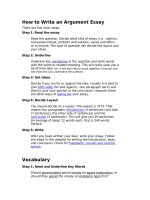Writing high scoring essays
Bạn đang xem bản rút gọn của tài liệu. Xem và tải ngay bản đầy đủ của tài liệu tại đây (226.56 KB, 4 trang )
English Pro Tips
Writing High-Scoring IELTS Essays
In this PDF, we look at some practical tips and ideas on how to improve your IELTS
essay writing. Specifically, we're going to be looking at the five steps of effective
essay writing.
The Five Steps Of Effective Essay Writing
Step 1: Underline the keywords + identify the question type
Step 2: Identify which structure to use
Step 3: Generate ideas
Step 4: Follow your essay structure
Step 5: Check your writing
Let's see it in practice. Here's a typical IELTS question:
Parents should not allow young children to play computer games.
To what extent do you agree or disagree?
Step 1: Underline the keywords + identify the question type
Parents should not allow young children to play computer games.
To what extent do you agree or disagree?
In the first stage, we should make some important observations about the question:
1. This is an agree-disagree question (not an advantage/disadvantage, discussion question, etc.)
2. We're talking about "parents" making this decision (not schools/ government/ etc.)
3. We're talking about "young children" (we shouldn't focus on teenagers)
4. We're talking about "computer games" (not other types of games like board games)
Step 2: Identify which structure you are going to use
There are lots of different essay structures you can choose from. In your preparation, it's a good idea to
familiarise yourself with a few different structures that you can use for different question types.
The number of ideas you will want to mention will depend on the structure you choose. In this example,
we're going to use the "70/30 Structure" so we need 3 ideas. (we'll look at this structure in more detail
later in the lesson)
© English Pro Tips
English Pro Tips
Step 3: Generate ideas
At this stage, we can use the "multiple-perspectives approach" to generate ideas for our essay. In
this approach, we aim to think of the main groups of people affected and also to think about the
question from different perspectives (e.g. a developmental perspective, environmental perspective,
economic perspective, etc.).
This is a skill that you should practice before your test day so that you can do it quickly and without
having to write down your ideas.
Brainstorm all the people affected and how they might feel:
- Young children
Feel: frustrated because they can't play computer games while their friends can.
Developmental perspective: young children might actually learn skills from playing computer
games.
Health perspective: young children might get addicted to computer games and spend less time
interacting with other children or playing outside.
- Parents
Feel: relieved that their children are entertained, which gives them more peace and quiet.
Feel: worried that their children might become addicted to the games and isolated from others.
Feel: worried that their children might be exposed to violent games.
Solution: let children computer video games but control the type of games and the quantity of time
spent playing.
At this stage during your preparation, you can take some time to research the topic
on the internet. Use sites like procon.org to discover new ideas and perspectives on
the question. Over time, this will help develop your critical thinking skills.
Once we have a few ideas, we should select the ideas that are easiest for us to write about and also
think about examples for those ideas.
Remember, you are not assessed on the
complexity of your ideas. You are assessed on
your ability to convey and develop your ideas. As
a result, it's often best to write about ideas that
you feel comfortable explaining and that you can
develop with examples and details (rather than
the cleverest or most novel idea) 😊
© English Pro Tips
English Pro Tips
Step 4: Follow your essay structure
Even though there are many different essay question types in IELTS, we can answer the majority of
them with one structure!
➡ The 70/30 Structure
In this structure, you present both sides of the debate and you 30% agree with one side and 70% agree
with the other.
Here's how it will look:
Introduction
Introduce the topic (whether parents should let their children play computer games)
Respond to the question (parents should, but should also control type of game and playing time)
Body Paragraph 1- Present one idea from the side that you don't agree with
Topic sentence (excessive game play can lead to addiction and isolation)
Development (young children find it difficult to regulate the time spent playing)
Link (more time spent playing games = worse the effects)
Body Paragraph 2- Present ideas from the side that you agree with
Topic sentence (positive effects of game play)
Development (examples of skills developed)
Link (any concluding remarks about this idea)
Body Paragraph 3- Present a consideration from the side you agree with
Topic sentence (parents should control type of game and playing time)
Development (children can make use of the benefits of computer games with fewer downsides)
Link (any concluding remarks about this idea)
Conclusion
Summarise the ideas (briefly mention the idea computer games can be beneficial but excessive
game play can cause problems)
Restate our position (restate the position that parents should let their children play video games but
that they should control the time spent playing games and the type of games that are played)
With this essay structure, you only need 3 ideas!
You can also combine body
paragraph 2 and 3 into one
paragraph.
© English Pro Tips
English Pro Tips
Let's have a go writing this essay:
Parents should not allow young children to play on computer games.
To what extent do you agree or disagree?
Some parents do not allow their children to play computer games as they worry about the potential
effects of excessive gameplay on cognitive and social development. However, others believe that video
games can help develop valuable skills. I would argue that parents should allow their young children to
play computer games; nevertheless, they should also place limits on their children's gameplay time.
Many parents forbid their children from playing computer games because they are worried that
excessive gameplay can lead to addiction and isolation. Unfortunately, these beliefs are not unfounded.
Young children often find it challenging to regulate the time spent playing video games, and many
games tend to be solitary, violent and lead to long periods of inactivity. This can be especially
troublesome when gameplay replaces more productive activities such as playing outside with friends.
However, there are also positive effects of video games for young children. Through playing such
games, young children can develop useful cognitive skills. For example, many video games require
logical thinking skills, quick reactions and problem-solving skills to reach higher levels; other games
may require players to work collectively to complete tasks. Hence, video games can be an enjoyable
and productive activity simultaneously.
I would argue that parents should allow their young children to play video games but restrict the type
and time spent playing such games. In this way, their children can reap the cognitive benefits of playing
games while staying clear of addiction. Essentially, limiting the time in which they spend on video
games ensures that they also partake in other activities, such as playing with friends and being outside.
In conclusion, while computer games can help young children develop useful skills, excessive playing
time can also lead to inactivity and anti-social behaviour. Therefore, I would argue that parents should
allow their young children to play video games but control the type of game and time spent playing.
Step 5: Check your writing
1. Check for spelling mistakes
2. Look for grammar mistakes
3. Check your punctuation
4. Have you used linking words correctly?
5. Have you used the best word to convey your idea?
6. Are there any words that you repeat too often?
7. Try to make your handwriting to look neat: cross your "t"s and dot your "i"s.
© English Pro Tips









